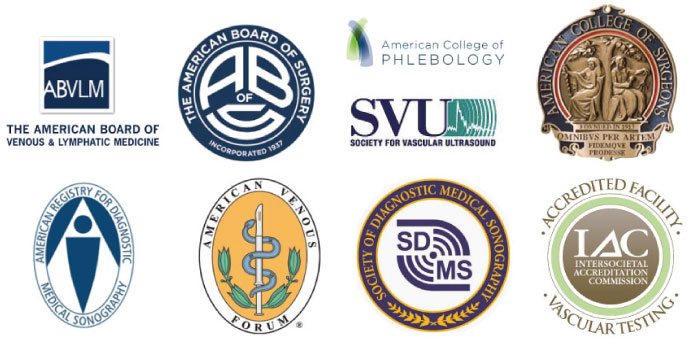Before undergoing a vein procedure...
1. The patient should choose a vein care center based on the skill set and experience of the physician, and the quality of the facility. Is the physician dedicated to treating vein disease on a full-time basis? Part-timers are usually more involved with their primary specialty, leaving less than adequate time at the vein clinic. Conflicting responsibilities can lead to scheduling difficulties and inability to deal with a patient’s concerns, should they arise outside the limited time the physician is in the clinic. Part-time phlebologists are less likely to attend national meetings on venous and lymphatic disease because of their commitment to their primary specialty. Physicians without surgical training may shy away from surgical treatments such as phlebectomy, even if that surgical option is the better choice. Ask your vein care specialists if their ultrasound program is accredited by the Intersocietal Accreditation Commission (IAC). Accreditation assures you that the staff is properly trained, that time tested protocols meeting the standard of care are followed, and that there is a sound ethical code. The sonographers should be registered vascular technologists (RVT) and the physicians who are interpreting the studies should be registered physicians in vascular interpretation (RPVI), unless they are radiologists. These qualifications are designated by the American Registry for Diagnostic Medical Sonography (ARDMS).
2. Today’s aggressive marketing environment promotes conflicting information about the health risks of spider veins and varicose veins. These do not pose a significant health risk unless they reach advanced age with skin damage. Treatment of spider veins is cosmetic. The same is true for asymptomatic varicose veins. Insurance plans will only cover varicose vein treatments if the bulging veins are associated with the leg heaviness, aching, pain, itching, or burning of the skin. Leg or ankle swelling, skin damage, and leg wounds or ulcers are also medical indications for venous diagnosis and treatment. Ask your vein specialist if ablation of a vein is really beneficial. If you have heart disease and your veins are not dilated, you might consider saving them in the event you need coronary artery bypass surgery, especially if your vein symptoms are relatively mild.
3. If your vein doctor performs ablation and phlebectomy on different days, you may be at risk for developing phlebitis because of stasis of the blood in large varicosities. Results are generally better and patients prefer to have everything completed in one session.
4. Free veins screenings are often a marketing technique designed to bring patients into the vein center. They should not be offered to asymptomatic patients, except those who intend to undergo cosmetic sclerotherapy for spider veins. Reflux detected in an asymptomatic patient suggest that the odds for long-term success of sclerotherapy may be compromised in the presence of elevated venous pressure.
5. Ask your phlebologist if reprocessed radio frequency catheters or previously used laser fibers are utilized in that vein clinic’s procedures, and if they present additional health risk.
6. Consider the difference between phlebectomy and sclerotherapy for varicose vein removal. With phlebectomy, there is virtual certainty of success in the hands of a skilled surgeon. The veins can be quickly and efficiently removed through 1 mm incisions and there is minimal inflammation following the procedure. With sclerotherapy, success does not approach 100%. The effectiveness of sclerotherapy diminishes with increasing vein size. In addition, treating larger veins requires higher concentrations of sclerosant and this leads to inflammation and possible staining of the skin. The inflamed veins can remain sore for weeks or months.

